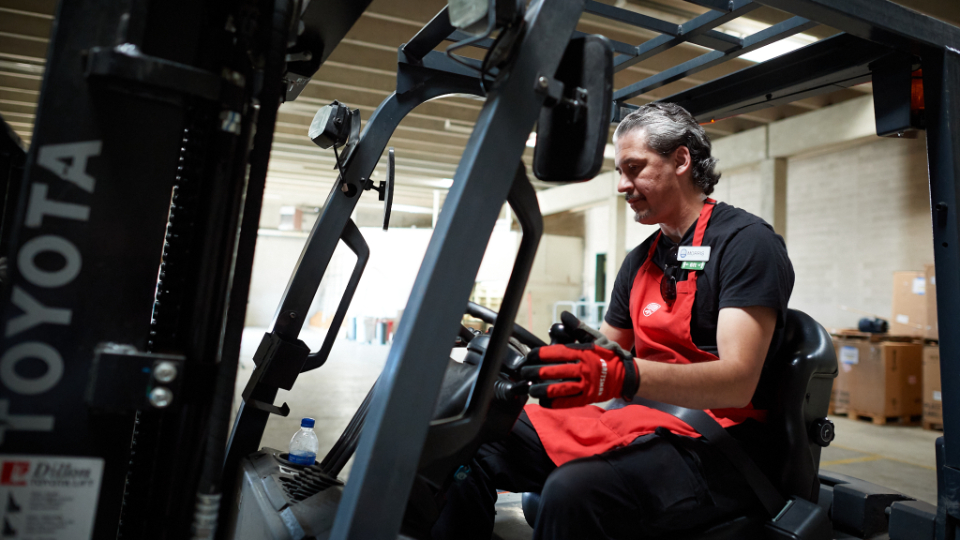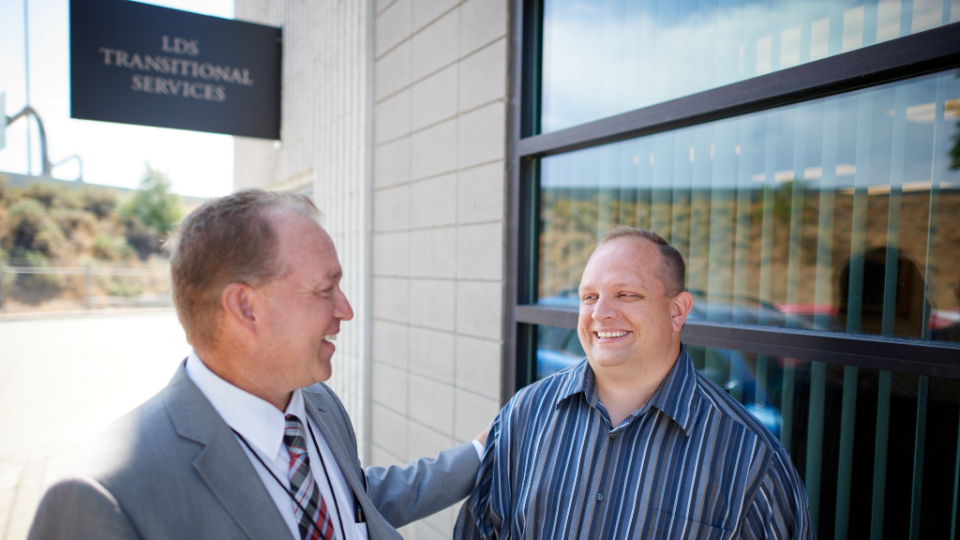The Church of Jesus Christ of Latter-day Saints’ Transitional Services initiative continues to expand its reach to help individuals stabilize their lives and transition back into society.
“I’m a guy who’s just trying to rebuild his life after a setback,” said 48-year-old Garrett Morris.
Originally from Oakland, California, Morris works in Murray, Utah, as a forklift operator at Deseret Industries, a nonprofit work-training organization owned and operated by the Church.
“Back in 2002, 2003, 2005 and 2006, I ended up working too hard and ended up turning to some substances I shouldn’t have,” he said. As a result, he served almost 10 years in prison.
While incarcerated, the lifelong musician and Latter-day Saint met a Church leader at the prison who encouraged him to share his musical talents.
That Church leader later wrote him a letter that Morris cherishes even today.
“[He] got a hold of me and pointed me in the direction of the Transitional Services before I got out,” Morris said.
“I remember his letter to me said, ‘You know, that’s what we’re here for. It’s our pleasure to help, so please let us do that because you uplift people with music in prison. Let me help you when you get out,’” Morris recalled. “I’ve been very lucky with some good people that have helped me along that path.”
Upon his release, Morris said the initiative assisted him with short-term assistance, including clothing, food and a bicycle.
Since 2019, the Church’s Transitional Services initiative has assisted more than 26,000 individuals like Morris, regardless of their religious affiliation. These are men and women who have struggled to stand on their own feet after exiting correction facilities, facing homelessness or falling victim to human trafficking, mental health issues, domestic violence and more.
Beyond temporal assistance, Transitional Services also helps people find jobs and general information about community and government resources to increase their long-term stability.
They have five offices in Utah (Cedar City, Logan, Ogden, Provo and Salt Lake City) and two more in Las Vegas, Nevada, and Mesa, Arizona.
“It took a tremendous weight off my shoulders and helped me concentrate on looking for a job,” Morris said. “[It gave me] confidence to get a job because you’re at least worth some help, you feel that you’re worth at least the kindness of feeding, of clothing, of caring how you are. This means a lot to someone trying to restart their life after damaging themself and hurting people.”
The immediate social reintegration support that Transitional Services offices provide to Morris and others accompanies opportunities to work for what they receive.
Morris explained that shortly after he obtained welfare assistance, Church service missionaries connected him with the chance to work as a forklift operator at Deseret Industries. Since then, he said his personal goals have only increased.

TS2
Garrett Morris from Oakland, California, operates a forklift at Deseret Industries, a nonprofit work-training organization owned and operated by the Church, on Wednesday, July 21, 2021, in Murray, Utah.2021 by Intellectual Reserve, Inc. All rights reserved.“I’m trying to get back to school for my commercial driver’s license so I can be a truck driver,” he said. “So, this [job] is going to be kind of my prerequisite in trying to get my depth perception back and know how to handle a machine again. It’s kind of a steppingstone.
“My obligation to anybody I’ve ever hurt, whether it’s that circumstance or another, is to be a better person going forward,” Morris said. “For them to still say, ‘I know that you’re a human being, you’re still deserving of something else other than punishment,’” he said. “That’s been a huge blessing just for me to function as a human being.”
At the Las Vegas office, Jackeline Sahbaz met Elder James Turner and his wife Rene, both service missionaries who connect unemployed single mothers and others in similar situations with resources to help them get back on their feet.
“I needed some help because I lost my job for almost a whole year,” Sahbaz said. “The program helped me to understand better the way of, you know, applying for jobs, the way of, you know, the things that you have to put in your resume, how you have to do the interviews.”
‘I’ve never felt so loved and welcomed,’ said Transitional Services Initiative Beneficiary
“I think it’s so crucial that you look them in the eye and make them feel of worth or you can’t make any progress,” said Viola Murray, who served more than four years as a service missionary at the Transitional Services Office in Salt Lake City. While there, she assisted women in need who were searching for ways to start their road to recovery.
Murray dedicated her daily volunteer work at state prisons and the Transitional Services Office to listening, identifying needs and connecting beneficiaries with resources that could help them rebuild their lives.
“The type of situations that come in here are so varied,” Murray said. “I’ve seen everything from human trafficking to addiction to severe poverty, severe trauma cases, PTSD and just plain destituteness and hopelessness. And when they hit that rock bottom, a lot of them come here, and oftentimes we are their last resort. And, unfortunately, some don’t make it here.”
Those serving at Transitional Services offices provide information, encouragement, counsel and assistance to help individuals and families meet immediate needs.
Just over two years ago, Murray met a 48-year-old woman from Salt Lake City, Utah, who preferred not to be named.

TS6
Viola Murray, a former transitional services initiative service missionary that volunteered to help individuals stabilize their lives for more than four years reunites with a beneficiary of the program on Wednesday, July 21, 2021, at the initiative’s office at Welfare Square in Salt Lake City, Utah. 2021 by Intellectual Reserve, Inc. All rights reserved.“When I first came in, I met you,” the woman said as she spoke with Murray recently. “I remember I had left a place that wasn’t healthy for me, and I had been sober for four months. I remember walking in here with nowhere to go, and I met you, and you just believed in me.”
The woman explained that in 2019, after living through domestic violence with her former partner and developing substance abuse because of that, she decided to live a sober life.
In the process of looking for resources to help with her recovery, she found out about Transitional Services, made her way on foot to the office and met Murray, someone who she said holds a special place in her heart.
“I still talk to them now, you know,” she said, referring to the human connections she made throughout the experience. “I’ve never felt so loved and welcomed.”
“We started connecting her with the resources that we felt she needed and miracle upon miracles happened,” Murray said.
Today, she is no longer homeless and said she feels grateful and hopeful about her future. She now works full time at a substance detox facility and has recently enrolled in college to study psychology.
‘To preserve life, to relieve suffering and to foster self-reliance in the individuals that are here’
Thirty-eight-year-old Christopher Hugie of Logan, Utah, said that after being released from prison, he felt hopeless. Over time, he applied for more than 3,000 jobs and received only four offers. Employers shied away when they discovered his criminal history.
“The constant rejection. The constant in my face, ‘Hey, sorry this isn’t going to work,’” Hugie said.
Transitional Services’ general manager Greg Young, who leads the initiative’s offices across the United States, sat next to Hugie.
“I just broke down and started crying,” Hugie said. “‘Come back here with me.’ And that was hard, making myself vulnerable after the end of the prison system for so long as you learned [and] tried being tough, not letting people see your emotion. And having Greg there actually care. That was monumental to me.”
 Download Photo
Download PhotoAfter working as the manager of the initiative for more than 12 years, Young said he meets people like Hugie every day.
“I do this because I love the people that I work with. I love the missionaries that I get to work with on a daily basis. But most of all, [I do this for] those that come in our doors that have special needs, that are homeless or transient or that are coming out of correctional facilities,” Young said.
Young shared that on average, four service missionaries welcome dozens of individuals who walk through the Salt Lake City office’s doors every day.
“We are a temporary assistance program, looking at long-term solutions,” he said. “A few of our main focuses [are] to preserve life, to relieve suffering and to foster self-reliance in the individuals that are here in our offices. That in itself ... is also intermingled with focusing in on the Savior and the Savior’s love.”
During the brief reunion, Hugie shared that besides remarrying and finding an employer that took a chance to hire him in spite of his criminal background, he has also completed an associate degree with a nearly perfect grade point average.
For people who now face hardships and are looking to get back on track with Transitional Services help, Hugie offered some words of wisdom.
“Do all the small things that don’t make sense right now, and it will make sense down the road because it works,” he said.